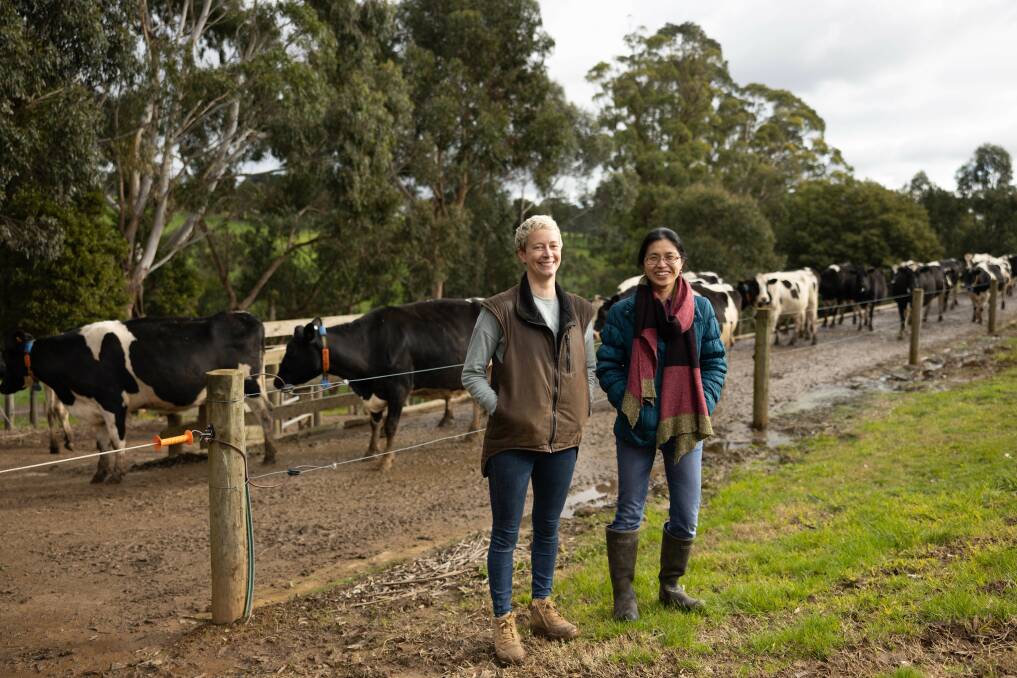Subscribe now for unlimited access to all our agricultural news
across the nation
or signup to continue reading

The 'First 100 Days' project - part of the DairyFeedbase research program at the Ellinbank SMARTFARM - has been targeting improved profitability in the first 100 days of lactation through nutritional interventions, primarily around the rate and type of concentrate supplements fed to cows.
Increasing dry matter intake as quickly as possible post-calving is crucial to optimising milk production and reducing the incidence of metabolic health conditions.
In the First 100 Days project, it was shown that a grain mix comprising maize grain and canola meal fed in the fresh period (first 21 days of lactation) was superior to wheat and canola meal in terms of milk production and feed intake, when a high-quality forage source was also offered.
Following this fresh period strategy with a concentrate mix containing wheat grain, barley grain and canola meal (WBC) at a mix ratio of 25:50:25 in the early lactation period (22-100 days of lactation) was shown to be $185 per cow more profitable than feeding equivalent amounts of a wheat-only concentrate supplement, across the same period.
Metabolic health and reproduction benefits
The other key part the First 100 Days research project looked at, was the impact feeding strategies can have on the metabolic health and reproductive performance of cows.
Experiments testing the effects of nutritional strategies on animal performance are often short-term - making it a challenge to understand the longer-term impacts.
"We haven't really had the opportunity to value the improved metabolic health and reproductive performance from feeding different diets before," Agriculture Victoria scientist Dr Vicky Russo said.
"The First 100 Days experiments have been longer in duration, so we have had the data to do the analysis."
In a collaborative effort with scientists in the DairyBio program and veterinary epidemiologist John Morton, the First 100 Days research team developed relationships between herd reproduction and several blood metabolites (which can be useful indicators of varying reproductive performance).
This made use of data previously collected and comprised 5211 cow-samplings from 23 herds.
A simulation model was then built to assess the physical and financial impact of changes in herd reproductive performance on farm profit.
These two elements were then combined to investigate the impact of diets tested in the First 100 Days experiments.
Project leader and Agriculture Victoria scientist Dr Christie Ho said: "When we looked at the experiment where a maize grain and canola-meal based supplement was fed in the first 21 days of lactation - followed by a wheat and barley grain plus canola-meal based supplement from 22 to 100 days of lactation - we found that these cows had the largest improvement in reproductive performance and profit."
This would be worth about $50 to $100 per cow per lactation, in addition to the profit obtained from the extra milk production.
"We found there was a potential total of around $270 per cow to be gained from feeding the maize and canola meal-based supplement in the fresh period and the wheat, barley and canola meal grain mix in early lactation," Dr Ho said.
"This provides enormous potential for extra profit."
To watch a video about the DairyFeedbase First 100 Days project, copy this online link youtu.be/ogb1-pcQYmE
The DairyFeedbase program is a joint initiative between Agriculture Victoria, Dairy Australia and Gardiner Dairy Foundation.
Want to read more stories like this?
Sign up below (select Dairy News) to receive our e-newsletter delivered fresh to your email in-box twice a week.

